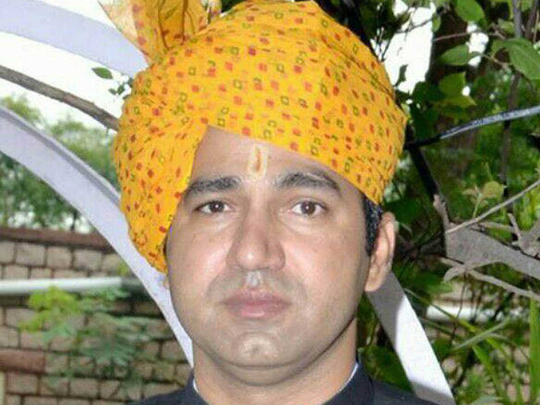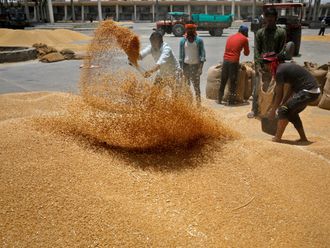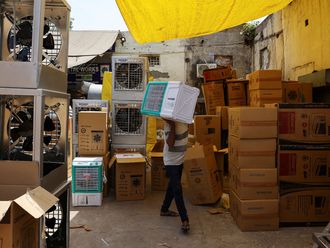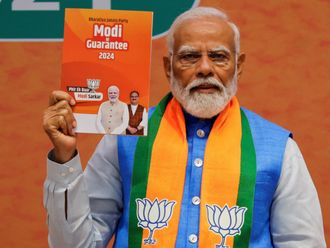
New Delhi: In July last, the daring 2010-batch Indian Administrative Services (IAS) officer jumped off a helicopter to save children trapped in flood at Vada Bhadvi village of Jalore district, saving lives of eight children.
In December, as winter set in, bringing joy to many people who look forward to lazing in the sun and wearing colourful woollens, it became a bane for the poor who neither have a roof over their heads, nor the basic essential footwear. But 34-year-old Dr Jitendra Kumar Soni, district collector and district magistrate of Jhalawar in Rajasthan, initiated a scheme ‘Charan Paduka’ that aims at distributing shoes to the deprived and downtrodden children. Feeling the pain of barefoot children, he vowed to change the way they walk to school, setting an example for others to follow with his inspirational plan.
Soni informs, “I come from a humble background. My father worked hard as a watchmaker so that his sons could attend school. We have seen hardships in life and can understand the plight of children who go to school in extreme weather conditions, only because they want to educate themselves and change their lives. What I do now is my way of giving back something meaningful to society.”
Bringing about a change in lives, his actions have made inroads in the minds of youngsters, who are keen on continuing such deeds in future.
He speaks to Gulf News.
GULF NEWS: What made you launch the ‘Charan Paduka’ scheme?
JITENDRA KUMAR SONI: As district collector of Jalore, one day I was passing by a school along with some staff members and found three barefoot children. Despite being dressed in woollen clothing, we all were shivering, but these Class 6 students were walking down the road bearing the brunt of chilly weather. Seeing them, I could barely concentrate on the work I was headed for and took those children to the market to purchase shoes for them. I still remember the look on their faces. They were on the verge of tears and hugged me. I can neither forget nor explain the satisfaction I got at that point of time when they said they would carry on such initiatives on growing up.
So, how did the scheme start and when?
I lost no time in ordering a survey to find out about more such barefoot students in schools that fell in my district. In a matter of few days we realised that the number ran into thousands. And once the schools began reporting about barefoot children, a list was prepared, which showed about 25,000 children required shoes and we went on an overdrive.
How did you address the issue and manage the funds?
It all happened on its own. Even while I contributed some amount from my end, the media had already covered the incident of the three children. Empathising with the kids, individual donors as well as institutions began coming forward to support the cause. Before January 26, India’s Republic Day, we managed to provide footwear to all 25,000 children. This has now become people’s scheme and I am just playing the role of a facilitator to ensure poor students of my district are empowered.
Will this be a regular feature from now on?
Of course, but not just once a year. We plan to help out children in winters as well as summers. So, henceforth, shoes and slippers would be distributed before India’s Independence Day (August 15) and Republic Day.
Apart from assisting children, what other good has come off it?
It gives me immense pleasure to know that taking a cue from our initiative, the scheme has now been adapted by the Rajasthan government. It has given directions to the collectors of all 33 districts of the state to replicate the scheme, which, no doubt, will help millions of children.
Have you undertaken other initiatives in the past?
I launched a GPS-enabled mobile inspection and monitoring system for effective scrutiny of various government schemes and development projects. The objective of the initiative is to eliminate delays and errors in the government run projects. The hi-tech system, launched early this year, helps keep track on projects in real time. Under the system, supervisors have been provided with a mobile device that helps capture the work stage details, images, videos and other relevant data, which can be transmitted to the concerned officials. This geo-tagging ensures transparency and timely completion of the projects.
Do you have other such schemes in mind?
Having tasted success with the shoes campaign, other plans are being worked upon. But these will require assistance from the state government. Under the National Rural Livelihood Mission programme, we wish to distribute sanitary napkins for free to girls in schools and colleges. Another initiative that I am working on is to modify transport vehicles, which can serve as mobile schools to reach the remote villages in rural areas. It will enable those above 20 years of age gain basic education, as most shy away from sitting in a class with students much junior to them.
Profile
Dr Jitendra Kumar Soni was born on November 29, 1981 in Dhanasar village, Hanumangarh district of Rajasthan to mother Reshma and father Mohan Lal Soni.
He did his schooling from Government School, Rawatsar — 1994.
Graduated from Khalsa College, Sri Ganga Nagar — 1999.
Served as teacher at the Government Middle School, Nehrawali Dhani, Hanumangarh — 2005-2006.
Worked as a lecturer of Political Science in Government Senior Secondary School in Nethrana district, Hanumangarh.
Passed Indian Administrative Services exams — 2010.
Worked as subdivisional magistrate in Sirohi, Mount Abu — 2012 — 2014.
Appointed chief executive officer in Zila Parishad, Jaipur — 2014.
Became district collector and district magistrate, Jalore — 2014 — 2016.












